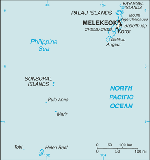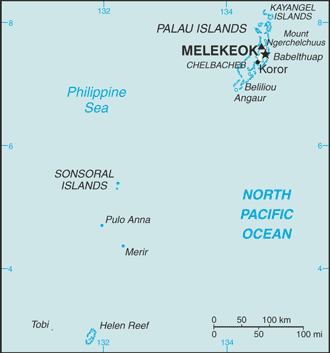 Palau
Palau
Country Specific Information
On this page » |
|
March 10, 2009
COUNTRY DESCRIPTION: 
 The Republic of Palau is a constitutional democracy in free association with the United States. Palau is an archipelago
consisting of several hundred volcanic and limestone islands and coral atolls, few of which are inhabited, and is politically
divided into 16 states. Palau’s developing economy depends on tourism, marine resources and a small agricultural sector.
Two kinds of public transportation are available, taxi and Airai bus service. Palau International Airport is located on Babeldaob
Island, near Koror Island. Direct commercial air service to Palau exists from Manila, Taipei, and Guam. Read the Department
of State Background Notes on Palau for additional information.
The Republic of Palau is a constitutional democracy in free association with the United States. Palau is an archipelago
consisting of several hundred volcanic and limestone islands and coral atolls, few of which are inhabited, and is politically
divided into 16 states. Palau’s developing economy depends on tourism, marine resources and a small agricultural sector.
Two kinds of public transportation are available, taxi and Airai bus service. Palau International Airport is located on Babeldaob
Island, near Koror Island. Direct commercial air service to Palau exists from Manila, Taipei, and Guam. Read the Department
of State Background Notes on Palau for additional information.
ENTRY REQUIREMENTS: Citizens and nationals of the United States of America, with the exception of United States military personnel, must have a passport valid for at least six months from date of entry. A visa is not required for U.S. citizens visiting Palau for one year or less, provided the visitor otherwise complies with applicable regulations, for example, on employment. U.S. military personnel must present official orders or documents certifying status; U.S. military dependents ten years or older must have a U.S. Government-issued photo-identification card showing the name, date of birth, and status of the bearer. For more information about entry requirements to Palau, travelers may consult with the Embassy of Palau, 1700 Pennsylvania Avenue NW, Suite 400, Washington, DC 20036, (202) 452-6814. Visit the Embassy of Palau's web site for the most current information.
Information about dual nationality or the prevention of international child abduction can be found on our web site. For further information about customs regulations, please read our Customs Information Sheet.
SAFETY AND SECURITY: For the latest security information, Americans traveling abroad should regularly monitor the Department of State, Bureau of Consular Affairs' web site, where the current Travel Warnings and Travel Alerts, as well as the Worldwide Caution, can be found.
Up-to-date information on safety and security can also be obtained by calling 1-888-407-4747 toll-free in the U.S. and Canada, or for callers outside the U.S. and Canada, a regular toll-line at 1-202-501-4444. These numbers are available from 8:00 a.m. to 8:00 p.m. Eastern Time, Monday through Friday (except U.S. federal holidays).
The Department of State urges American citizens to take responsibility for their own personal security while traveling overseas. For general information about appropriate measures travelers can take to protect themselves in an overseas environment, see the Department of State's A Safe Trip Abroad.
CRIME: Although the crime rate in Palau is relatively low, foreign residents can be the target of petty and, rarely, violent crimes, as well as other random acts against individuals and property. Therefore, visitors should not be complacent regarding personal safety or the protection of valuables.
INFORMATION FOR VICTIMS OF CRIME: The loss or theft abroad of a U.S. passport should be reported immediately to the local police and the nearest U.S. embassy or consulate. If you are the victim of a crime while overseas, in addition to reporting to local police, please contact the nearest U.S. embassy or consulate for assistance. The embassy/consulate staff can, for example, assist you to find appropriate medical care, to contact family members or friends and explain how funds could be transferred. Although the investigation and prosecution of the crime is solely the responsibility of local authorities, consular officers can help you to understand the local criminal justice process and to find an attorney, if needed.
The local equivalent to the €œ911€ emergency line in Palau is: 911.
Please see our information on Victims of Crime, including possible victim compensation programs in the United States.
CRIMINAL PENALTIES: While in a foreign country, a U.S. citizen is subject to that country's laws and regulations, which sometimes differ significantly from those in the United States and may not afford the protections available to the individual under U.S. law. Penalties for breaking the law can be more severe than those in the United States for similar offenses. Persons violating Palauan laws, even unknowingly, may be expelled, arrested or imprisoned. Penalties for possession or use of, or trafficking in illegal drugs in Palau are severe, and convicted offenders can expect jail sentences and heavy fines. Engaging in sexual conduct with children or using or disseminating child pornography in a foreign country is a crime, prosecutable in the United States. Please see our information on Criminal Penalties.
SPECIAL CIRCUMSTANCES: The official currency of Palau is the U.S. dollar. Major credit cards, including Visa, Mastercard, and American Express, are accepted in most locations catering to tourists. There are several ATMs in Koror, located at branches of U.S. banks.
Koror State, where most tourist facilities are located, enforces a curfew between 2:30 a.m. and 5:00 a.m. Monday through Thursday, and between 4:00 a.m. and 6:00 a.m. Friday to Sunday and on national holidays.
Firearms of any kind are strictly prohibited in Palau. The penalty for possession of a firearm or ammunition is up to fifteen years imprisonment. Palau customs authorities may enforce strict regulations concerning temporary importation into or export from Palau of certain other items. It is advisable to contact the Embassy of Palau in Washington, D.C., for specific information regarding customs requirements.
General information regarding disaster preparedness is available via the Bureau of Consular Affairs' website, and from the U.S. Federal Emergency Management Agency (FEMA) home page.
Please see our Customs Information sheet.
MEDICAL FACILITIES AND HEALTH INFORMATION: Health facilities in Palau are adequate for routine medical care, but limited in availability and quality. Doctors and hospitals often expect immediate cash payment for health services. Serious medical conditions requiring hospitalization or evacuation to the United States or elsewhere may cost thousands of dollars.
Information on vaccinations and other health precautions, such as safe food and water precautions and insect bite protection, may be obtained from the Centers for Disease Control and Prevention's (CDC) hotline for international travelers at 1-877-FYI-TRIP (1-877-394-8747) or via the CDC's web site. For information about outbreaks of infectious diseases abroad, consult the World Health Organization's (WHO) web site. Further health information for travelers is available from the WHO.
MEDICAL INSURANCE: The Department of State strongly urges Americans to consult with their medical insurance company prior to traveling abroad to confirm whether their policy applies overseas and whether it will cover emergency expenses such as a medical evacuation. Please see our information on medical insurance overseas.
TRAFFIC SAFETY AND ROAD CONDITIONS: While in a foreign country, U.S. citizens may encounter road conditions that differ significantly from those in the United States. The information below concerning Palau is provided for general reference only, and may not be totally accurate in a particular location or circumstance.
Palau accepts a driver's license issued by a U.S. state or military authority. Many roads in Koror, where the vast majority of the population lives, are in fair condition, but lack sidewalks and have little or no shoulder. Construction of the main road connecting the airport with downtown Koror has been completed. In addition, the newly constructed roadway, known as the €œCompact Road,€ that loops around the large island of Babeldaob is in excellent condition. Secondary roads connecting villages to the Compact Road vary in quality from good to rough. The national speed limit is 25 miles per hour, but drivers routinely ignore this limit on the good-quality roads, and traffic often moves slower in congested areas. Passing slow-moving vehicles is illegal, but drivers do this routinely, creating potentially dangerous situations. Drunken drivers are a late-night hazard in Palau.
Please refer to our Road Safety page for more information.
AVIATION SAFETY OVERSIGHT: As there is no direct commercial air service to the United States by carriers registered in Palau, the U.S. Federal Aviation Administration (FAA) has not assessed the government of Palau'sCivil Aviation Authority for compliance with International Civil Aviation Organization (ICAO) aviation safety standards. Further information may be found on the FAA's website.
CHILDREN'S ISSUES: For information see our Office of Children's Issues web pages on intercountry adoption and international parental child abduction.
REGISTRATION/EMBASSY LOCATION: Americans living in or visiting Palau are encouraged to register at the Consular Section of the U.S. Embassy in Koror or through the State Department's travel registration web site, and to obtain updated information on travel and security within Palau. Americans without Internet access may register directly with the nearest U.S. embassy or consulate. By registering, American citizens make it easier for the embassy or consulate to contact them in case of emergency. The U.S. Embassy is located in Airai State, in an area known as Omsangel. There is no street address. The mailing address is: PO Box 6028, Koror, Palau 96940. The telephone number is (680) 587-2920/2990. The fax number is (680) 587-2911. The Embassy does not issue passports; that function is performed by the Honolulu Passport Agency.
* * *
This replaces the Country Specific Information dated July 11, 2008, to update the section on Registration/Embassy Location.

